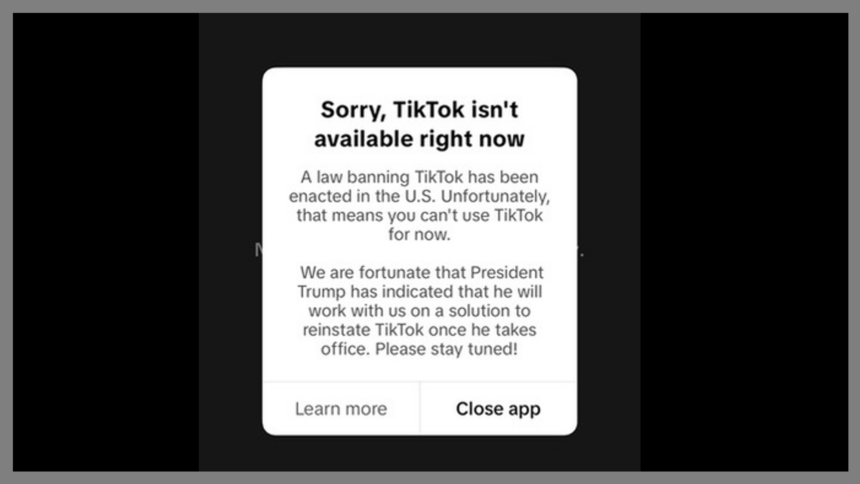TikTok went dark in the U.S. Sunday morning after the Supreme Court upheld a law banning the app. This is the final blow in a long-standing battle over data privacy and national security concerns. TikTok’s future in the U.S. is now uncertain. Here’s what you need to know about the ban, the law’s implications, and what this means for users and creators alike.
What’s Happening & Why This Matters
Supreme Court Decision: TikTok Banned
On 17 January 2025, the U.S. Supreme Court ruled to uphold a law that bans TikTok in the United States. The decision came after months of legal challenges, including a lengthy battle over whether the ban violates the First Amendment. The court determined that the ban does not infringe upon free speech because it is based on ownership concerns, not content regulation.
The law, known as the Protecting Americans from Foreign Adversary Controlled Applications Act, mandates the removal of TikTok from U.S. app stores and requires online hosting services to cease supporting the app. Starting 19 January 19, TikTok and its sister apps like Lemon8 and CapCut will be inaccessible in the U.S. unless ByteDance, TikTok’s parent company, sells the app to a non-Chinese owner.
National Security Concerns: Why TikTok is Under Fire
The U.S. government’s primary concern with TikTok is data privacy and national security. Authorities worry that ByteDance could be pressured by the Chinese government to share sensitive data on American users. The app collects vast amounts of personal information, including location, browsing habits, and more, raising alarms about the potential for espionage or covert influence.
FBI Director Christopher Wray has stated that TikTok poses a “national security risk” because of its connection to the Chinese government. The Chinese government could use the app to manipulate public opinion or influence U.S. politics. These concerns have gained traction amid increasing scrutiny over foreign tech influence in the U.S.
TikTok’s Legal Response, Business Impact
TikTok has vehemently opposed the ban, claiming that it constitutes unconstitutional censorship. The company argues that the ban could lead to significant economic losses for creators and businesses that rely on the platform. TikTok estimates that small businesses could lose over $1 billion in revenue. Creators might face $300 million in lost earnings each month if the ban remains enforced.
The company has also suggested that the ban could affect millions of American users, especially given the app’s popularity among younger demographics. In response, TikTok has attempted to address security concerns through its “Project Texas” plan. “Project Texas” proposed a U.S.-based data management structure to insulate American data from foreign influence. However, this plan did not convince the government to lift the ban threat.
Potential Alternatives
Despite the court ruling, TikTok’s fate may not yet be sealed. The U.S. president, currently Joe Biden until Monday, could grant a 90-day extension if TikTok is on the verge of divesting its operations to a U.S. company. However, with the incoming Trump administration, the situation is uncertain. Trump has suggested that he will intervene and work on a solution to “save” TikTok.
In the meantime, users are looking to alternative platforms — Instagram Reels, YouTube Shorts, and Snapchat — which offer similar video-sharing features. These platforms are expected to benefit from the TikTok ban, especially among the younger audience that has embraced TikTok’s addictive content.
TF Summary: What’s Next
The Supreme Court’s decision and the ban implementations are seminal in the TikTok-U.S. saga. While the platform’s U.S. operations are now officially off, there appears an appetite for negotiation that finds a way to stay operational on American shores. In the meantime, users and creators are adapting to the new normal. They are joining platforms to bypass these restrictions. As this story develops post-inauguration, it will be vital to watch updates from both the government and TikTok itself. The social media’s future U.S. regulations hang in the balance.


